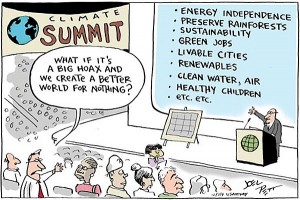Sun 8 May 2011
Denying Climate Deniers
Posted by Lucia Green-Weiskel under UncategorizedComments Off on Denying Climate Deniers
May 9, 2011
I have to admit I don’t spend much time thinking about the tedious war on science known as “climate change denial.” I find this contrarian bunch to be small-minded and senseless and mostly just boring because without any scientific credentials they are trying to make a scientific argument (that climate change doesn’t exist or if it does, it is natural) with which 99.9% of trained scientists disagree. Personally, I’d rather get my science from scientists.
But there is a bigger reason not to waste my valuable cranial capacity coming up with responses and counter points to this giddy flock of charlatans: Even if they were right, it wouldn’t matter.
First of all, we know that Earth has serious environmental problems. Urban air pollution, trashed rivers and algae covered lakes are palpable evidence. We also know that we waste a lot of energy, through inefficient technologies or practices. Fossil fuels are expensive, pollution is ugly and fresh healthy food and environments are good. These are pretty basic assumptions that I think most people can agree with. Even if the human-generated greenhouse gases emitted into the earth’s atmosphere don’t cause sea levels to rise resulting in wide spread destruction of arable land, food shortages, environmental refuges and widespread disease, it is still a good idea to clean up our environment and use energy more efficiently. The cartoon below sums up the logic I am getting at:
The other reason why climate deniers are not interesting to me is that the energy policy of the largest emitting country in the world, China, is not driven by the science they aim to destroy. I was surprised to learn that many of the members on the climate change negotiation team in at the high-profile UN climate change conferences in Cancun and Copenhagen held personal beliefs that were aligned with climate deniers. Even one of my colleagues admitted to me a few months back that she “isn’t sure that climate change exists.” This is a woman I have been working with for five years on promoting climate change policy in China, so at first I was taken aback when I heard her confession. But then I learned that what I call “climate change policy” she thinks of as “sensible energy policy”. Same concept and purpose, different rationales and language. If you want a clean environment, healthy air and water and cheap and abundant renewable energy, it doesn’t matter if climate change exists or not. They are different means to the same end. And, regardless of the science, geopolitics dictates that China needs to have an energy policy that will promise inexpensive and abundant sources of energy in the coming decades.
In 1993, China became a net importer of oil. In 2009, China became a net importer of coal. In 2010 China’s rapidly growing economy surged ahead to become the largest consumer of energy in the world. Today, coal, oil and natural gas fuel the Chinese economy. But those sources are becoming more expensive and available only in distant and (often war torn) parts of the world. If China is going to keep its economy growing at the current rate, it will need to expand its exploitation of new sources of energy, like hydro, solar, wind and nuclear. As the second largest economy in the world, growing at an annual rate of 10%, China doesn’t have a choice of this or that type of energy. It must take whatever it can get.
Concern over climate change has brought new urgency to green technology and the renewable energy industry, transforming the market and breathing new life into solar and wind farms, electric vehicles and low-carbon appliances. While these products may help the world avoid climate disasters, from China’s point of view, they also help China continue its break-neck growth rate without becoming too dependent on imported fossil fuels. In short, the need to diversify energy sources is a far more important driver of China’s energy policy than climate change.
So we have an odd situation where a country run by lawyers (the US) is incubating climate deniers who have launched a war on science. And a country run by scientists (China) doesn’t really care about the science of climate change, but is enacting ambitious new climate-saving policies on the basis of geopolitics. Go figure.
But it is for that reason that I don’t spend much time concerned about the fact that many of China’s top climate policy makers are climate deniers (although I do worry about this fact, very much, in the US).


